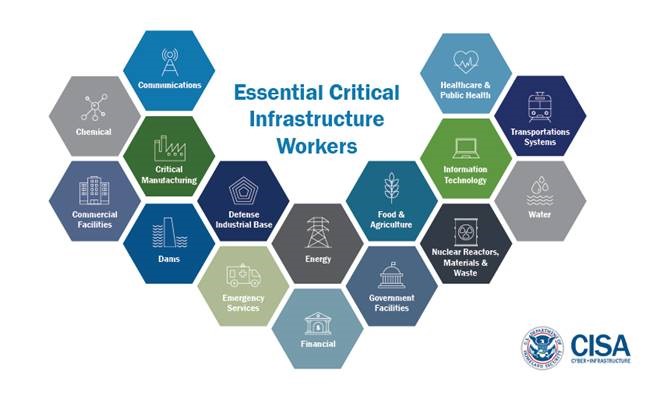Water/Wastewater/Public Works Workers Deemed Critical in Virus Crisis


As guidance for elected officials and public works agencies, the U.S. Department of Homeland Security has designated water, wastewater, drainage and public works employees as Essential Critical Infrastructure Workers during the COVID-19 emergency.
Also included are electricity industry workers, including those involved in power transmission and distribution, and environmental remediation/monitoring technicians.
The full list of essential workers, released through the DHS’s Cybersecurity and Infrastructure Security Agency, is designed to help state and local officials and industry to make decisions about their responses to protect public health and safety and community well-being. The guidance says that “certain critical infrastructure industries have a special responsibility in these times to continue operations” of services and functions Americans depend on daily.
Agencies are advised to follow guidance from the federal Centers for Disease Control and their state and local governments and to follow strategies to protect their workers and reduce the chances of spreading disease.
These are just some of the workers listed:
WATER AND WASTEWATER
Employees needed to operate and maintain drinking water and wastewater/drainage infrastructure, including:
- Operational staff at water authorities
- Operational staff at community water systems
- Operational staff at wastewater treatment facilities
- Workers repairing water and wastewater conveyances and performing required sampling or monitoring
- Operational staff for water distribution and testing
- Operational staff at wastewater collection facilities
- Operational staff and technical support for SCADA Control systems
- Chemical disinfectant suppliers for wastewater and personnel protection
- Workers that maintain digital systems infrastructure supporting water and wastewater operations
PUBLIC WORKS
- Workers who support the operation, inspection, and maintenance of essential dams, locks and levees
- Workers who support the operation, inspection, and maintenance of essential public works facilities and operations, including bridges, water and sewer main breaks, fleet maintenance personnel, construction of critical or strategic infrastructure, traffic signal maintenance, emergency location services for buried utilities, maintenance of digital systems infrastructure supporting public works operations, and other emergent issues
- Workers such as plumbers, electricians, exterminators, and other service providers who provide services that are necessary to maintaining the safety, sanitation, and essential operation of residences
- Support, such as road and line clearing, to ensure the availability of needed facilities, transportation, energy and communications
- Support to ensure the effective removal, storage, and disposal of residential and commercial solid waste and hazardous waste
ADDITIONAL RESOURCES
- Learn more at CISA.GOV.
- The Water Information Sharing and Analysis Center (WaterISAC) also is providing resources for members.


